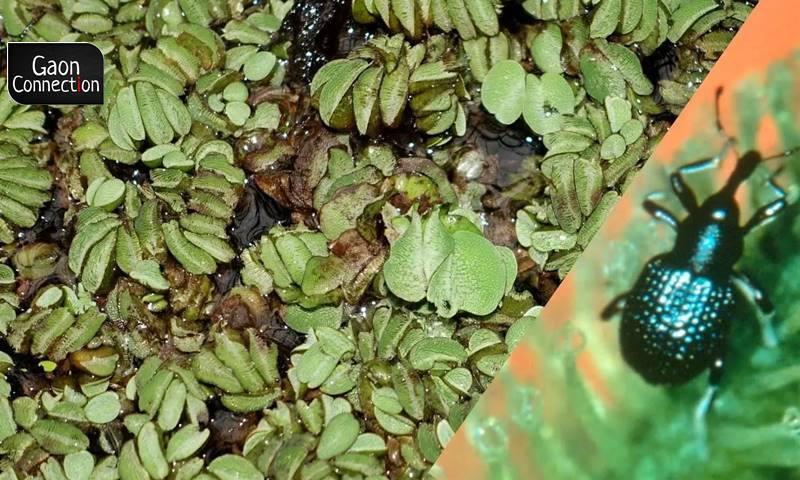Rajesh Patel remembers the day when a farmer threw some Chinese jhaalar in the village pond saying that it has medicinal properties for the cattle.
“The pond supports the water needs of the entire village. It sprawls across 56 acres (similar to the size of 41 football fields). Whether the village’s cattle need water for drinking or people need it for their daily use, the pond is highly useful. Ever since Chinese jhaalar plant has begun to grow in the pond, it has created a huge problem for us,” Patel, the sarpanch (head) of Padua village in Madhya Pradesh’s Katni district told Gaon Connection.
“Initially it was alright as the plant grew in small patches but soon it began to engulf the entire surface of the pond. It became difficult to extract even a lota (small tumbler) of water without some fragments of the plant mixing with it. No matter how much we tried to clean the pond and remove it, it always grew back,” he added.
Also Read: Water hyacinth — a nuisance for water bodies, can now be used to produce organic fertilisers
The stubborn plant which Patel calls as Chinese jhalar is actually an invasive plant species called ‘Salvinia molesta’ and is one of the fastest growing aquatic plants in the world. In order to help the villagers in Padua in securing their pond, scientists from the Jabalpur-based Directorate of Weed Research have introduced an insect which feeds on this plant and helps in cleaning the pond.
Interestingly, both the plant and the insect are native to Brazil and are nature’s way of balancing out each other.
Also Read: Thai guavas help a farmer in Dhar, Madhya Pradesh script his success story
Insect to rescue when all other measures fail
The insect, Cyrtobagous salviniae, is unique in many ways. Sushil Kumar, a scientist from the weed research institute told Gaon Connection that the insect eats nothing but this plant.
“The Cyrtobagous salviniae will die but will not eat anything other than the invasive plant Salvinia molesta. In the process, this insect acts as a ‘bio-agent’ and helps in getting rid of the plant,” Kumar said.
The scientist informed that about three years back, in December 2019, about 2,000 of these insects were thrown into the pond at the Padua village.
“This invasive plant was first detected in the southern state of Kerala. Soon it spread to other states like Karnataka, Odisha, Uttarakhand and Maharashtra. In Kerala, this same insect was used to get rid of this weed. So, we decided to do the same. We brought some of these insects from Bengaluru and spread them across the pond,” the scientist told Gaon Connection.
Also Read: Non-pesticidal management in agriculture is a win-win for farmers and consumers
Invasion checked, mission accomplished
Once the insects are transferred in a water body that is reeling under the unchecked growth of the Salvinia molesta weed, it takes a while for them to get a grip over the plant.
“In the initial six months, no change was visible on the growth of the plant as it was probably growing faster than the insects ate it off. But gradually, in about 11 months, almost half of the weed got wiped off,” the scientist said.
“In almost 18 months, the pond returned to normalcy and the weed disappeared completely. It was for the first time that the bio-agent was used successfully as a potent weedicide,” he added.
Also Read: A zero tillage seed drill assures farmers of better yield and more savings
The scientist further informed that apart from Katni district, this invasive specie was also found in Betul district which is located almost 440 kilometers away from Katni.
लोकसभा में अपने लोकसभा क्षेत्र के सतपुड़ा जलाशय (सारणी) में फैली जलीय खरपतवार (चाइनीज़ झालर) को हटाने हेतु तथा इसके रखरखाव का जिम्मा केंद्रीय जल मंत्रालय द्वारा किये जाने के संदर्भ में केंद्रीय जल मंत्री जी तथा माननीय प्रधानमंत्री जी के समक्ष आग्रह किया@LokSabhaSectt @PMOIndia pic.twitter.com/418pnwKrrS
— Durgadas Uikey 🇮🇳 (@DdUikey) December 14, 2021
“We are about to launch a similar project there as well. Generally, one such insect costs around eight rupees but various other organisations are being pitched to reduce the cost,” he added.
In Betul district, this invasive plant has spread in the Satpura lake. Member of Parliament from the Betul Harda and Harsud constituency Durgadas Uikey had raised the issue in the recently concluded Winter Session of the Parliament.



















